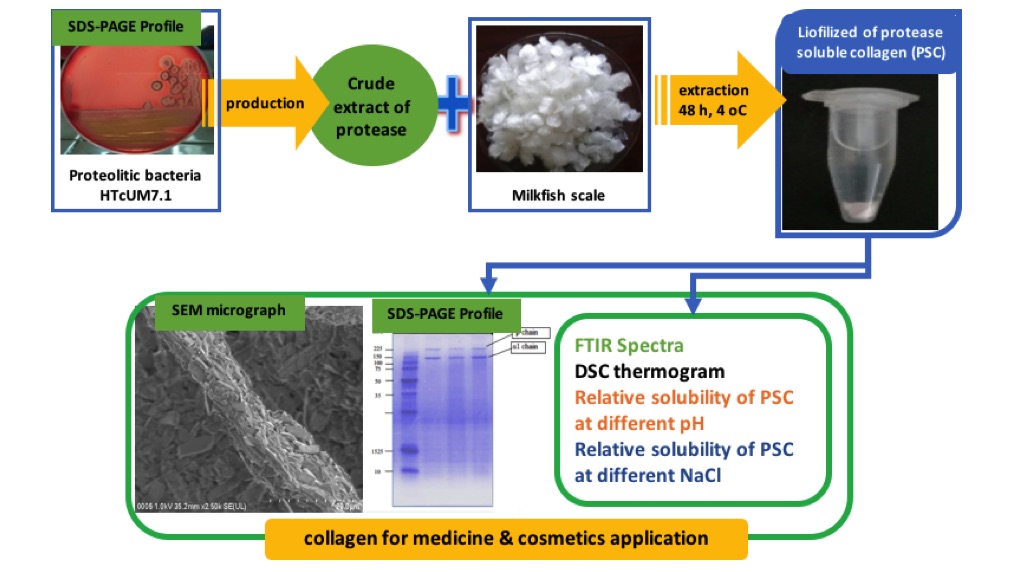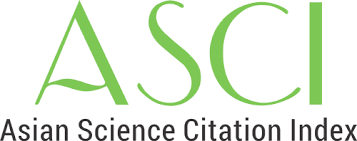Characterization of Protease Soluble Collagen (PSC) From Milkfish Scales (Chanos chanos)
Abstract

The aim of this study was to characterize protease soluble collagen (PSC) obtained from milkfish scales, extraction using protease from proteolytic bacteria HTcUM7.1 isolate. The characterization included Fourier Transform Infra Red (FT-IR) spectra, Sodium Dodecyl Sulfate Polyacrylamide Gel Electrophoresis (SDS-PAGE) profile, Field Emission Scanning Electron Microscopy (FESEM), denaturation temperature by Differential Scanning Calorimetric (DSC) and solubility. The resulting PSC from milkfish scales has white color, fiber with a length of about 20-60 µm, FTIR spectra and SDS-PAGE profile showed that PSC was collagen Type I and denaturation temperature was 145.48 °C, with maximum solubility at pH 1-3 and 1-2 % NaCl. Its high denaturation temperature value allows the collagen to be applied in the fields of medicines and cosmetics.
References
[1] Bae, I., Osatomi, K., Yoshida, A., Osako, K., Yamaguchi, A., and Hara, K., Food Chem., 2008, 108(1), 49–54.
[2] Li, Z. R., Wang, B., Chi, C.F., Zhang, Q. H., Gong, Y.D., Tang, J.J., Luo, H.Y., and Ding, G.F., Food Hydrocoll., 2013. 31(1),103–13.
[3] Rochima, E. Sekar, N., Buwono, I.D., Afrianto, E. and Pratama, R.I., Aquat. Procedia.2016, 7, 76–84.
[4] Liang, Q., Wang, L., Sun, W., Wang, Z., Xu, J. and Ma, H., Process Biochem., 2014. 49(2), 318–23.
[5] Zhang, J., Duan, R., Tian, Y., and Konno, K., Food Chem., 2009, 116(1), 318–22.
[6] Nagai, T., Izumi, M., and Ishii, M., Int. J. Food Sci. Tech., 2004, 39(3), 239–44.
[7] Kaewdang, O., Benjakul, S., Kaewmanee, T., and Kishimura, H., Food Chem., 2014. 155, 264–70.
[8] Matmaroh, K., Benjakul, S., Prodpran, T., Encarnacion, A.B., and Kishimura, H., Food Chem., 2011, 129(3),1179–86.
[9] Okazaki, E. and Osako, K., Food Chem., 2014., 149, 264–270.
[10] Singh, P., Benjakul, S., Maqsood, S. and Kishimura, H., Food Chem. 2011, 124(1):97–105.
[11] Wang, L., An, X., Yang, F., Xin, Z., Zhao, L., and Hu, Q., Food Chem., .2008. 108(2), 616–623.
[12] Suphatharaprateep, W., Cheirsilp, B., and Jongjareonrak, A., New Biotechnol., 2011. 28(6), 649–655.
[13] Mahboob, S., Haider, S., Sultana, S., Al- Ghanim, K., AL-Misned, F., Al-Balawi, H.A.K., and Ahmad, Z., J. Anim. Plant Sci., 2014, 24(6), 1802-1810.
[14] Kementerian Kelautan dan Perikanan Indonesia. Laporan Kinerja Kementrian Kelautan dan Perikanan Indonesia 2014. Indonesia, 2014.
[15] Jamilah, B., Hartina, M.R.U., Hashim, M.D., Sazili, A.Q., Int. Food Res. J., 2013, 20(2), 835-842.
[16] Susanti, E., Lutfiana, N., and Retnosari, R., Screening of Proteolytic Bacteria from Tauco Surabaya Based on Pathogenicity and Selectivity of Its Protease on Milky Fish (Chanos chanos) Scales for Healthy and Halal Collagen Production. in IOP Conf. Ser. Mater. Sci. Eng., 509, 012044.
[17] Brinckmann, J., Collagens at a Glance. in Collagen, 2005, 247, 1–6.
[18] Rahayu, M., and Susanti, E., Jurnal Kimia Riset. 2017, 2(2), 98-107.
[19] Laemmli, U. K. Nature. 1970. 227(5259), 680–685
[20] Nagai, T., Tanoue, Y., and Kai, N., J. Food Sci. Technol., 2015, 52(4), 2344-2351.
[21] Chi, C.F., Cao, Z.H., Wang, B., Hu, F.Y., Li, Z.R., and Zhang, B., Molecules. 2014. 19(8), 11211–30.
[22] Kong, J., and Yu, S., Acta Biochim. Biophys. Sin., 2007. 39(8), 549–59.
[23] Muyonga, J. H., Cole, C.G.B., and Duodu, K.G., Food Chem., 2004. (85) 81–89.
[24] Gadi, D.S., Trilaksani, W., and Nurhayati, T., Jurnal Ilmu dan Teknologi Kelautan Tropis. 2017, 9(2), 665-683.
[25] Suptijah, P., Indriani, D., and Wardoyo, S.E., Jurnal Sains Natural. 2018. 8(1), 8-23.
[26] Babu, I.R., and Ganesh, K.N., J. Am. Chem. Soc., 2001, 123 (9), 2079-2080.
[27] Kittiphattanabawon, P., Benjakul, S., Visessanguan, W., Nagai, T., and Tanaka, M., Food Chem., 2005, 89(3), 363–372.
Refbacks
- There are currently no refbacks.

This work is licensed under a Creative Commons Attribution-NonCommercial 4.0 International License.








